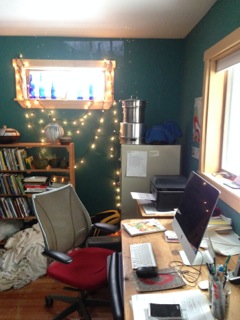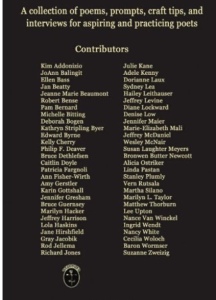Lisa Gluskin Stonestreet. The Greenhouse. Durham, NC: Bull City Press, 2014. 44 pages. $14, paper.
When my daughter, now 11, was a few months old, I began to feel the restlessness of not writing, the longing to get back to my poet self, my self self. One afternoon, I carried her up to my bed, and she lay on her back like a starfish, her head turned toward me while I read Elizabeth Bishop aloud to her wide and wondering eyes. After an unplanned C-section, more than a week in the hospital fighting off infections and a massive hematoma, and a long period of recovery, I hadn’t given poetry or writing much thought. I was focused on my health and on my beautiful daughter who was oblivious to what I’d gone through to bring her into the world. I now felt ready to begin the journey – not back to whom I was as a writer and a woman but toward whom I would become as a writer, woman, and also, a mother.
I offer this anecdote, because I’ve recently read Lisa Gluskin Stonestreet’s gorgeous chapbook, The Greenhouse, and I can’t stop thinking about this period of my life. Stonestreet constructs her poems into a narrative of motherhood that span the early years, when a mother’s self is newly woven to accommodate a child. The experience of reading this book is not unlike peeking into a personal journal written by someone who half expects it to be discovered tucked inside a desk drawer. The voice is deeply intimate and honest. “It’s only beginning to recede, that time, that milk-dream of a year,” the speaker says in “Flowers, Doggies, the Moon.” We become hypnotized by the rhythms of “the long hours in the rocking chair,” and “the mommy memoirs: nurse, bathe, dress, change, sleep, fail to sleep; feel about it.” The speaker reveals all at once her love for her child and her impatience with maternal rituals that tether her to another human being. What mother can’t relate to this feeling, this sense that we are always “calling up the masks of patience, again”? Stonestreet renders beautifully the inner conflict many new mothers feel, which is often complicated by how we’re told we’re “supposed to feel.”
In the essay, “Language and the Gaze at the Other,” the poet Gillian Conoley writes,
Surely the mother experiences a heightened sense of other, for she has quite literally, physically, produced one. For the mother who is an artist, this other, this experience of the other, comes very much into play in one’s aesthetics. I think one of the most interesting questions becomes the question of who is the “other” when the artist who is a mother creates. Who gets shut out? Who remains?
The Greenhouse is an acknowledgement of this complex relationship between mother and child. In “Chimera,” for example, Stonestreet uses as her central metaphor microchimerism, which is, as the epigraph reads, “the persistent presence of a few genetically distinct cells in an organism… cells containing the male Y chromosome were found circulating in the blood of women after pregnancy.” Stonestreet writes,
I want them out. I want
to be myself, my self
again. My old untethered,
young untied. I lie: I want
nothing more—or want
no more the point.
Dendritic, en-
twined, signed on
for the duration. Bright
tangle, snaking line
of fire. The crucible
does not ask
for want. Is. Tied in,
shot through. Fired.
This poem is an expression of the other about which Conoley writes. The speaker resists this other, but accepts that she too has “signed on / for the duration.”
Stonestreet’s language enacts the mystery that is motherhood, and in her case, it’s a mystery particular to a poet. In “What I Taught Him,” the speaker tries to read a book while her son sits eating in his highchair. The book is a “life-raft” and she obsesses over “the book the book the book,” which causes her to only half-hear what’s going on around her. In “After Dropping My Son Off at Preschool,” someone asks her Are you writing again? She is a mother who loves her boy, her anchor, but she yearns for her literary self at every turn. Gillian Conoley notes,
There is no doubt in my mind the extreme extent to which motherhood acts on identity. The formulation of identity, the slip and slide of language in bespeaking identity, the narratives ‘identity’ constructs, the presence of spirit, of grand mystery, the way all of this can come together in a single phrase – these are consistent concerns in the writing. To understand how motherhood affects the writing is like trying to glimpse the impossible…
In The Greenhouse, Lisa Gluskin Stonestreet endeavors to glimpse the impossible as she examines the life of a poet who is also a mother.
The first poem I attempted and failed after the birth of my daughter incorporated a doubling: the speaker was both a mother inside her home, and a young, carefree woman sprawled outside in the hammock, catching a beer buzz in the late afternoon. I missed my youth, but that time of my life was not unlike what Stonestreet describes in the final poem, “Anchor,” when she writes, “I used to worry I would float straight up / off the earth, snap my tether, fear and relief, I was 20, it was all meaningful / weather: flame & snow.” This is the paradox of maternal longing: to want what we no longer want.
More about this poet:
Lisa Gluskin Stonestreet’s The Greenhouse was awarded the 2014 Frost Place Prize and published by Bull City Press in September 2014. Her first book, Tulips, Water, Ash, was selected for the Morse Poetry Prize and published by University Press of New England. Her poems have been awarded a Javits fellowship and a Phelan Award, and have appeared in journals including The Kenyon Review, Cream City Review, At Length, Quarterly West, Blackbird, The Iowa Review, 32 Poems, and Third Coast and in the anthologies Best New Poets and The Bloomsbury Anthology of Contemporary Jewish American Poetry. She writes, edits, and teaches in Oakland, California. (www.lisagluskinstonestreet.com)















